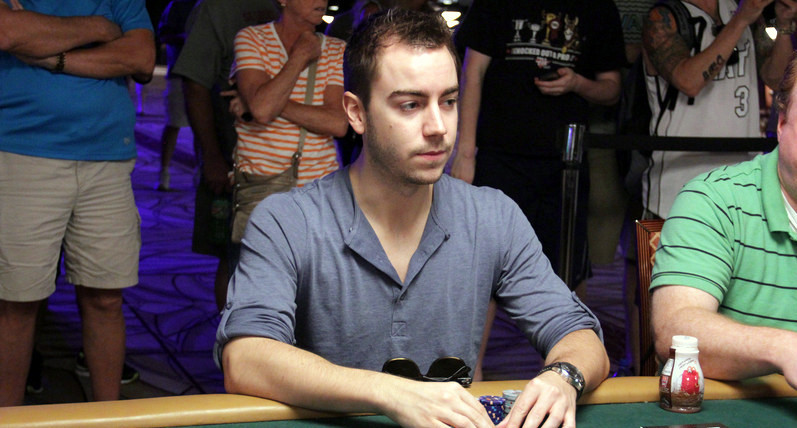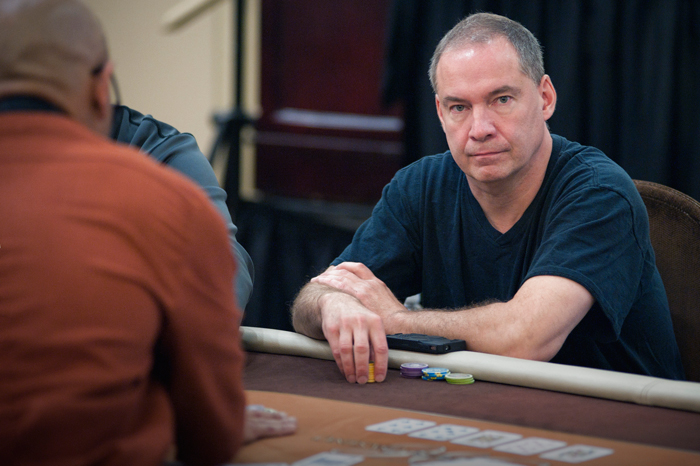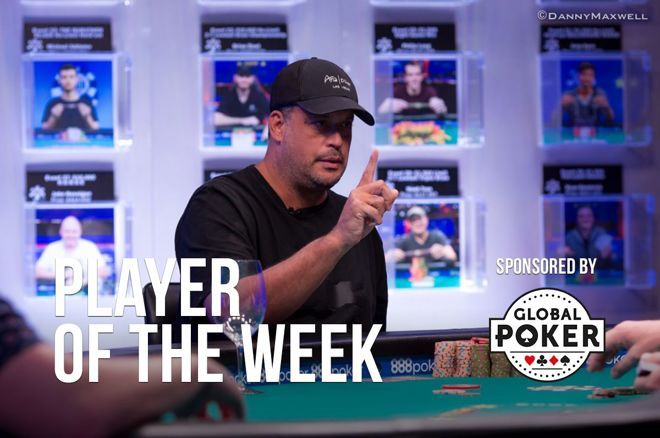Poker Pros Who Went Broke
Bad Bankroll Management. One of the most common reasons why successful poker players go.
Poker Pros Who Went Broke online. Roulette requires no skill to play, although it is helpful to learn the best bets to make. Live dealer roulette is the most exciting game to play on online casinos, but bettors can Poker Pros Who Went Broke find other roulette games to play online, too. From 2005 to 2007 Bill Edler was one of the hottest tournament players in the game. After earning a WSOP circuit ring at the Tunica MS circuit stop in 2006 he went on to finish fifth in the $1,000 Stud 8 or Better Event at the World Series of Poker. In 2007 Edler had his breakout year.
In my last column I covered five good reasons why some (in truth, most) poker players should not go pro. Today we'll cover five more reasons against doing so.
1. Your win rate is probably inflated because you are cherry-picking the time you play
So you've been averaging $20 an hour in your regular $1/$2 live game and winning at a consistently high rate online? That's great! However, that may not be indicative of what you'll earn when you are playing 40 or more hours a week to make your monthly nut. In fact, it probably isn't.
Most part-timers play around their full-time work schedules. That typically means they mostly play nights and weekends. They especially play on holiday weekends. When do you think the games are softest? That's right — those very times.
When you're forced to play full-time to make your expenses, you may not have the luxury of only playing when the games are best. You'll have to play at many other times as well, such as when few if any tourists or alcohol-softened regulars are in the room. You'll be up against other grinders like yourself who are trying to scratch out their salaries during the day. Or maybe even worse, you'll be playing against rocky retirees who are squeezing every white chip.
The fact is, your hourly win rate is likely to go down when you increase your hours.
2. Multipliers don't work as you think they do
It's easy to do the math. Let's see, you earned $200 in 10 hours playing $1/$2, so you should earn $800 hours for 40 hours, right? And in a year's time, playing for 50 weeks (generously giving yourself two weeks off a year), that comes to $40,000 a year. And that doesn't even count the extra money you can make in an occasional tournament and playing online at home.
You might also move up in stakes, going from $1/$2 to roughly double the stakes at $2/$5. That would have you increasing your hourly rate from $20/hour to $40/hour, wouldn't it? So you should easily earn the $40,000 you earn at your steady job. And the $40,000 is really like $50,000 because you won't have to pay taxes on it.
Wrong, wrong, and wrong. You do have to pay taxes, whether or not taxes are deducted. The IRS says you do. They can also legally collect back taxes if they catch you not paying, plus penalties and interest. But even if you think you'll get away with breaking the law, try borrowing money for a house or a car without any tax returns.
Also, as we've seen, more hours doesn't necessarily mean more hours at the same win rate. Stamina, focus, and concentration all come into play. You might find that when you work four times as many hours, you are half as strong a player at the end of the week as you are at the start of the week. You might even start to lose money over time.

The prospect of making more money per hour by moving up may also be an illusion.You will probably find the competition tougher as you move up. While the drag of the rake on your earnings will be relatively less, the drag on your earnings caused by playing against better players may be considerably greater. In fact, you might move up and start losing.
All of which is to say, don't start calculating your full-time earnings until you are actually working full-time.
3. Playing poker for a living becomes a job, and a job is... well... a job
You might not think this now, but many players actually find poker boring and unexciting when they do it for a living. It seems incredibly exciting when you're playing it for fun. It remains fun when you master it and start earning money. Few things feel as good as the positive feeling of winning a tournament or looking at your profits go up.
But when it becomes a job — your sole source of income — that feeling may change. Talk to those who have done it for five or more years, and who must do it. From my experience, having spoken with and interviewed hundreds of pros, though it remains an interesting and rewarding career for many, it is still a job (not an adventure), with all of the seriousness and responsibility of any job.
4. Variance happens
You've been playing seriously and winning for a few months, maybe even a year. But there can be long, devastating losing streaks as well. Talk to pros who have been on top of the world and then gone bust. The professional poker road is lined with people on the sides who have gone broke.
That's not saying all pros go broke. But so many of them do, at one time or another, because they aren't sufficiently capitalized to withstand the variance of a game that can be extremely cruel to even the best players.
Why risk throwing away your lifeline to a steady job until you have built a very, very, very stable safety net?
5. There are now many alternatives for the serious poker player that don't require 'going pro' full-time
Back in the day, before America's surge in gambling occurred around the 1990s and into the 21st century, if you really wanted to be a full-time professional poker player, you had only a few options. You either needed to tap into a tough, illegal, underground scene where you lived, or you had to move to Las Vegas or Southern California. There were a few other options (e.g., Seattle supported a few legal professionals), but that was pretty much it for the serious poker player.
That's no longer the case. There are decent low-, middle- and high-stakes legal public poker games, available 24/7, all across the United States today. Chances are, with riverboat gambling, charity poker rooms, casinos, liberalized gambling laws, and a constabulary that is much less earnest about cracking down on poker games, unless you live in the heart of the Bible Belt, you're probably less than a two-hour drive from at least a couple of decent legal games.
With the expanded popularity of poker on television and in popular culture, and all of the poker players it created, you probably have a few good underground games within a much shorter drive as well.
There's no longer a good reason to quit your job, pull up stakes, and start your life over again in a distant city. You can keep your job and play poker regularly in your off hours and days off. Why not do that, at least until you've earned a lot more money, for a much longer period of time?

A week has 168 hours in it. If your job takes up 40 hours and you sleep for another 56, that still leaves you 72 hours a week for playing poker. If you're really committed to playing poker, you can do it as a serious second job. Depending on your stamina and level of commitment (about which you have to be realistic), you can even work as many as 40 hours at it while keeping your day job.
See if you can start earning as much at poker as you earn at the straight job, plus enough extra to cover all of the benefits you get at work. That should be your goal. When you hit it, if you still love playing poker, and you have saved at least half a year's pay to support yourself, and have a full bankroll for supporting your game, then and only then can you quit your day job.
Ashley Adams has been playing poker for 50 years and writing about it since 2000. He is the author of hundreds of articles and two books, Winning 7-Card Stud (Kensington 2003) and Winning No-Limit Hold'em (Lighthouse 2012). He is also the host of poker radio show House of Cards. See www.houseofcardsradio.com for broadcast times, stations, and podcasts.
Tags
cash game strategytournament strategylive pokeronline pokerbankroll managementmental gametiltpsychology
Card Player Magazine, available in print and online, covers poker strategy, poker news, online and casino poker, and poker legislation. Sign up today for a digital subscription to access more than 800 magazine issues and get 26 new issues per year!
Because there aren’t any reliable statistics, nobody knows for sure how many poker pros die broke. But it’s certainly too many.
If you’re a pro, you have a much higher probability of dying broke than members of other professions, including people who earn much less than you’re winning now. Of course, you may think it won’t happen to you, but that’s also what they thought before they got busted.

This series will analyze why it happens so often and recommend the ways to avoid it.
The Primary Cause
Most of the specific causes discussed here will have one common factor, which is arrogance.
Self-confidence, of course, is essential for a successful pro, but you shouldn’t believe, 'I’m too special to die broke.”
No, you’re not.
You’re just another talented player, and it’s happened to many talented players. Are you more talented than the legendary Johnny Moss? What about Stu Ungar, Dave ‘Devilfish’ Ulliott, and Gavin Smith? Do you win more money?
Johnny won the first two World Series of Poker championships, but ended up dependent on charity from the Binion’s family. Stu was arguably history’s greatest no-limit tournament player, but he died in a crummy motel. He was a junkie, but drugs weren’t the only cause for his tragic ending. Devilfish and Gavin each won World Poker Tour and WSOP titles, along with millions in tournaments and cash games, but Phil Hellmuth and other pros have run charity tournaments or started crowdfunding pages to help their surviving families.
Nolan Dalla covered the tournament circuit for years. In a column for Poker Pages, he once wrote: “One of the most troubling aspects of the tournament circuit is seeing how many players are constantly broke. I’m not talking about bad poker players or novices. I’m talking about names and faces everyone would recognize… If former World Series of Poker winners are broke, what chance do you have of making it on the circuit? The odds are overwhelmingly stacked against you.”
You may say, “That’s irrelevant. I know tournaments are too risky. That’s why I play only for cash.” So what? If you walk into many large poker rooms, you’ll see players who once beat big cash games struggling to survive in small ones.
In fact, the worst fate isn’t dying broke; it’s living broke for your final years.
As you read this article, ask yourself, “How often do I make these mistakes?”
They Don’t Save Money
It’s the most common and easily avoided mistake. For thousands of years wise people have spent less than they made. In the Old Testament of the Bible, Joseph advised the Pharaoh to save grain in good years to avoid starvation in the bad ones.
You can easily see arrogance’s effects. Dozens of authorities have written that losing streaks are inevitable and have recommended saving money. But too many pros think, “That doesn’t apply to me because I’ll always beat the game.”
No, you won’t. You may never have a catastrophic losing streak, but variance virtually guarantees that you won’t always beat the game. If you add in the fact that your mental abilities will decline with age, you’ll certainly have some bad years. Even if you’re a net winner, you may not cover your expenses.
They Invest Poorly
Of course, some pros do save money, but they may not invest it well. Again, we see the effects of arrogance. They think, “I’m so smart that I don’t need any advice from investment professionals.” Poker players often make amateurish investment mistakes.
They Play Other Games
Some pros essentially ship money from poker tables to craps and other unbeatable games. They may never admit it, even to themselves, but in their secret hearts they believe those games may be unbeatable for ordinary people, but not for them.
“I’m so superior that the laws of probability and lots of other rules don’t apply to me.”
Arrogance also causes some outstanding tournament players to be ‘live ones’ in cash games. When some of them make the final table, their side-game opponents cheer them on. If they have a big tournament payday, their cash game opponents will probably get a nice piece of it.
“Their arrogance prevents them from learning from their past losses. They delude themselves that this time will be different, that their true superiority will allow them to beat games that have repeatedly defeated them.” (Schoonmaker, Arrogance, the Biggest Bankroll Buster)
They Cheat On Their Taxes
Some pros cheat, and a few don’t even file tax returns. Believe it or not, honestly paying your taxes can increase your long-term security.
First, you’ll pay more social security, a forced saving for retirement. Because the cost of living allowance frequently increases benefits, most people get back much more than they contributed.
Ask some struggling older pros if they get much social security. Some will say, “No,” and a few will admit, “I don’t get any.”
Second, if you don’t pay social security for at least ten years, you’re not eligible for Medicare. Medical costs become immensely higher as you get older, and they have busted countless older pros. Some older pros have severe health problems or die prematurely because they can’t afford treatments or preventative health care.
Third, you can use programs to deduct your retirement contributions, and the interest, dividends, and other profits accumulate tax free until you retire. You’ll build a secure retirement fund.
They Don’t Buy Health Insurance
It’s another effect of arrogance. Too many pros, especially young ones, think, “I don’t need health insurance because I’ll always be healthy.” They may be right, but it’s an extremely foolish risk.
Without health insurance your entire bankroll, health, and even your life are at risk every day. Too many pros have been busted by the enormous costs of an illness or accident.
They Don’t Protect Their Health
On this issue arrogance has subtler effects. You’ve read that you should eat healthy foods and exercise regularly, but may ignore those recommendations. Some pros subconsciously believe, “Those rules don’t apply to me.”
They rarely exercise and eat badly. They may even sneer at authorities such as Dr. Cardner because they think her recommendations about diet and exercise are irrelevant for poker players.
It’s another form of arrogance. They think that poker is unique, that the rules that apply to other activities don’t apply to playing poker.
Nonsense!
Poker Pros Who Went Broke
We have exactly the same bodies as everyone else, and mistreating our bodies has the same effects. We can’t play well if we don’t feel well.
Worse yet, poor health has much greater effects on poker pros’ incomes than on the incomes of other professionals. The late Barry Tanenbaum, wrote: “Professional poker is a ruthless meritocracy.”
You can make a living as a mediocre salesman, teacher, lawyer, carpenter, or doctor. Most people are mediocre, but nearly everyone makes a living. You can’t survive as a poker pro unless you’re among the best.
If you neglect your health, you’ll have higher medical costs, and you won’t play well enough to pay them. You probably won’t just die broke. You’ll also die a lot sooner.
What’s Next?
Future columns will describe other causes for dying broke and tell you how to retire securely. I hope you take them seriously. They can save your bankroll, your health, and your life.
Poker Pros Who Have Gone Broke
Visit Alan Schoonmaker’s website for access to his 14 books, 200+ articles, videos and podcasts.